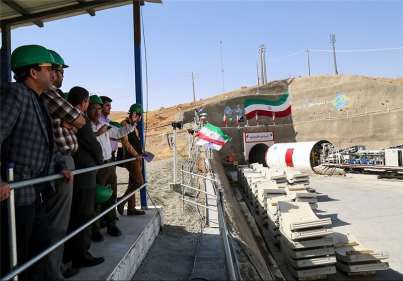
Statement by Save the Tigris Campaign Coalition
Save the Tigris Campaign is a coalition of civil society organisations from nine countries concerned with water justice in the Tigris-Euphrates basin. Our commitment is to the sustainable and equitable use of water for the sustenance of all, regardless of nationality or religion. We believe that the obstacles to this goal are rooted in policies that emphasise competition for water resources rather than co-operation in their management; in practices that encourage the squandering of water, whether in agriculture or in the home and in industry; and in the technocratic responses to water shortages, such as dams and water transfer schemes, that ignore the wider social and economic causes of water poverty. We encourage all communities within river basins to come together to manage jointly their water for the benefit of all.
We are concerned about the diversion of the Lesser Zab river by Iranian water transfer projects, which have reduced the flow of water into the Tigris River. Each year the water volume has been reported to drop significantly, especially during the summer months, as a result of upstream dams in Iran.
The Lesser Zab winds through the Zagros Mountains, originating in Iran and flowing through the Kurdistan Region of Iraq where it feeds the Dukan reservoir and fills into the Tigris River. The river is a major fresh water source for Sulaymaniyah and Kirkuk area, essential for the ecological balance of the region. In Western Iran, the Lesser Zab has recently played a key role in the restauration of Lake Urmia, a major salt lake which in recent decades had shrunk to only 10% of its size as a result of climate change,dam construction and overuse of water in commercial agriculture. In an ambitious plan to revive the lake, Iran announced Urmia was on its way to recovery thanks to increased precipitation, changes to agricultural practices and water transfers.
Such transfers have been facilitated by dams, as well as a large number of canals and tunnels. Three major dams have recently started operating on the Lesser Zab; Sardasht Dam started filling its reservoir in 2017 for hydroelectric purposes, while Silveh Dam (completed in 2018) and Kani Sib Dam (operational in late 2020) have been built for interbasin water transfer from the Lesser Zab to Urmia in an effort to restore the lake. Water from Silveh Dam will be poured into Godar Lake and then into Urmia Lake via a series of tunnels, while Badinabad tunnel will transfer water from Kani Sib Dam to Urmia. According to Isa Kalantari, Iran’s current head of the Department of Environment, 623 million cubic meters of water will enter Lake Urmia permanently annually as a result of water transfers from the Lesser Zab river. In addition, self-sufficiency in food production is a major goal of Iran, and water management is to support this aim. This push towards autarky is driven by US sanctions.
The impact of the Iranian water transfer projects on Iraq and the Kurdistan Region of Iraq will become increasingly visible in the coming years. The likely consequences are the loss of thousands of hectares of agricultural land in the Lesser Zab basin, and an imbalance in the riverine ecosystem. The Lesser Zab feeds the Dukan reservoir in the Kurdistan Region and the KRG is constructing a number of other dams on the Lesser Zab. Lack of water flows from Iran will render such dams useless. Meanwhile in Iran, water transfer projects have been the the focus of local opposition due to forced relocations, ecological and cultural impacts. Water scarcity and controversial water transfers and other environmental challenges have been the reason behind scattered protests in many Iranian regions in the past decade.
Water transfer projects are being implemented unilaterally by Iran, without joint coordination between Iran, Iraq and the Kurdistan Region, despite the existence of a joint committee. Lake Urmia is being restored in partnership between Iran, UNDP and the government of Japan, though the water transfer projects are funded independently from the international community. Save the Tigris is concerned these restoration efforts might happen at the expense of the Lesser Zab River, the Tigris Basin, and the Ahwar of Iraq, which are already under threat from extensive dam construction as well as unsustainable water withdrawls and pollution. While we support initiatives to help Iran save Lake Urmia, we believe those efforts should ensure that other fragile ecosystems are not damaged or destroyed in the process.
In the 2019 declaration of the Mesopotamian Water Forum, participating civil society organizations from Iran, Turkey, Syria Iraq, the Kurdistan Region called for an end to the cutting of transboundary water flows and pledged to advocate for negotiated agreements under legally binding internal law to ensure equitable sharing of the Tigris River. Referring to recent drops of waterflows in the Lesser Zab, we call on Iran, Iraq and the Kurdistan Region of Iraq to foster a dialogue on the management of transboundary rivers including the Lesser Zab. A joint committee can be a platform for sharing environmental impact assessments (EIAs) and data exchange regarding the alterations in the volume of the Lesser Zab. Iraq currently is updating its Strategy for Land and Water Resources (SWLRI). This strategy should take into account the impact of Iranian river diversions. Furthermore, we believe water shortages in the region are caused by overconsumption and mismanagement, including dam-building. While we believe Lake Urmia should be restored, additional dam construction and water transfers are not a suitable answer since they create additional riverine ecosystem disruptions and transboundary water conflicts. The restoration of Lake Urmia is a noble goal but should not happen at the expensive of populations downstream, human and non-human, who depend on the Lesser Zab for a living.

